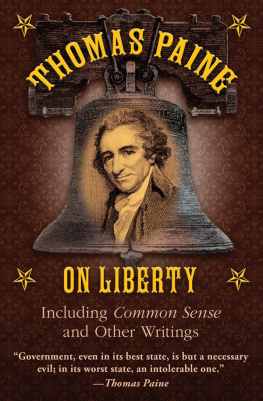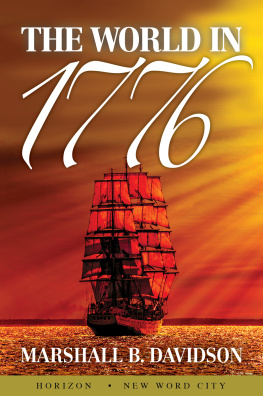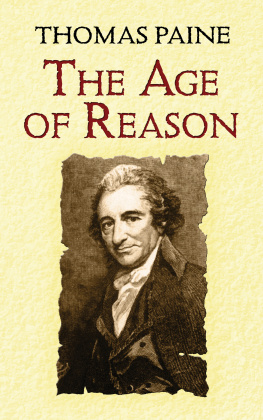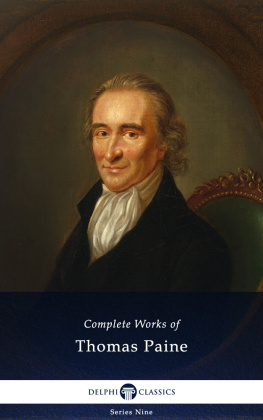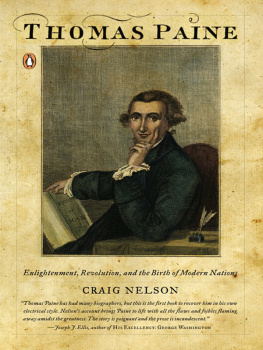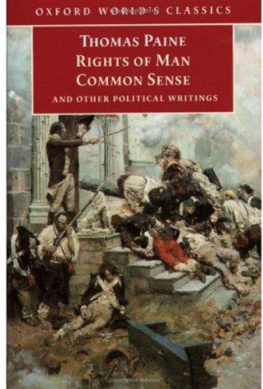First published 2009 by Pickering & Chatto (Publishers) Limited
Published 2016 by Routledge
2 Park Square, Milton Park, Abingdon, Oxon OX14 4RN
711 Third Avenue, New York, NY 10017, USA
Routledge is an imprint of the Taylor & Francis Group, an informa business
Copyright Taylor & Francis 2009
Copyright Editorial material Kenneth W. Burchell 2009
All rights reserved, including those of translation into foreign languages. No part of this book may be reprinted or reproduced or utilised in any form or by any electronic, mechanical, or other means, now known or hereafter invented, including photocopying and recording, or in any information storage or retrieval system, without permission in writing from the publishers.
Notice:
Product or corporate names may be trademarks or registered trademarks, and are used only for identification and explanation without intent to infringe.
BRITISH LIBRARY CATALOGUING IN PUBLICATION DATA
Thomas Paine and America, 17761809.
1. Paine, Thomas, 17371809 Influence. 2. Paine, Thomas, 17371809 Public opinion Sources. 3. Public opinion United States History 18th century. 4. Political culture United States Early works to 1800.
I. Burchell, Kenneth W.
320'.01'092-dc22
ISBN-13: 978-1-85196-964-7 (set)
Typeset by Pickering & Chatto (Publishers) Limited
[Silas Deane], Echo from the Temple of Wisdom, announced by Messiurs [sic] Common Truth, S.S.T.P., Common Honesty, C.P.S., Common Law, L.L.D. and 'Common Sense, Secretary to Foreign Affairs, and Author of all the Writings under the signature of Common Sense', or, A Constitutional Answer and Refutation of an Address to Mr. Silas Deane (Pliiladelphia, PA, 1779). American Philosophical Society, shelfmark Paine 68.Ec4.
The Silas Deane Affair was the first great military procurement scandal in the history of the United States of America and a critical chapter in the career of Thomas Paine.
Sometimes called the Lee-Deane Affair, the controversy hinged on the propriety of a commission billed to Congress by Silas Deane. Congress initially dispatched Deane as a secret envoy to investigate the possibility of the purchase of arms and supplies from the government of France. The agreement provided for Deane's travel, living expenses and a commission on any goods purchased on behalf of Congress. Unbeknownst to Congress, however, the French government had already determined to lend assistance with arms, gunpowder and supplies in the form of a gift. Silver worth 1 million each from France and Spain was deposited in a shell company called Roderigue Hortalez and Company, administered by the adventurer, speculator, inventor and author of The Marriage of Figaro, Pierre-Augustin Caron de Beaumarchais (1732-99). Deane and Beaumarchais appear to have opened a number of private accounts in addition to the 'money-laundering' operation on behalf of the Bourbon kings. Many of the books were lost or destroyed, and loose procedure immediately gave the appearance of conflict of interest.
When Deane placed a demand before Congress for a commission on the gifted funds, Dr Arthur Lee (1740-92) ofVirginia cried foul and accused Deane of malfeasance. Deane was recalled in order to make an explanation to Congress, but suspiciously he left his written records in France. Already sensitive to the issue of public service versus private profit, Congress erupted into several days of debate. Deane demanded a chance to appear before Congress in order to absolve himself but Congress, upset over Deane's lack of records, debated on without him. Deane complained that the ears of Congress were shut to him and took his case to the public in a letter published in the Pennsylvania Packet (Philadelphia), 5 December 1778, with 1,000 copies made into a handbill.
Ten days later, Paine entered the controversy with a series of letters that directly contested Deane's allegation against Congress. Second, and perhaps more importantly, the Bourbon monarchs wished the transaction to be secret. The French Minister to Congress, Alexandre Grard (1729-90), demanded that Paine be dismissed. Congress split on that matter, but when Paine was denied an opportunity to defend his own conduct, he resigned with a statement that he would not
in duty to my character as a freeman submit to be censured, unheard; therefore, to preserve that character and maintain that right, I think it my duty to resign the office of secretary to the committee for foreign affairs, and I do hereby resign the same.
All authorities identify the anonymous author of this text as Silas Deane. At a distance and without so much as the publisher's name on the title page, it is difficult to determine how widely it may have been read. Deane published 1,000 copies of his first public letter, so it may be safe to assume a similar run for this. What is absolutely certain is that the affair was a controversy of some notoriety whose themes echo down to the present time.
Echo from the Temple of Wildom, ANNOUNCED BY Meffiurs Common Truth, S. S. T. P.
Common Honesty, C. P. S.
Common Law, L. L. D.
And "Common Sense, Secretary to Foreign Affairs, and Author of all the Writings Under the Signature of Common Sense;" O R A Constitutional Answer and Refutation OF AN Address to Mr. SILAS DEANE, Approved of and agreed unto by a Majority of DELEGATES in General Congress, Of Senators, Orators, Grammarians, Rhetoricians, Logicians, Lawyers, Critics, Politicians, Patriots, Public Spirited Whigs, Connoiffeurs, Casuists, Divines, and Republicans; Mr. Common Sense himfelf Chief Speaker in and among them.
IN A SERIES OF LETTERS, By SOCRATES, Father of the House of Congress.
"What's in the Name of "Congress", that l should fear "To bring my Grievance to the public Ear."
Vide the American Crifis, Number II.
Servants, be obedient to them that are your Maiters according to the Flesh, with Fear and Trembling, in Singleness of your Hearts, as unto Christ.
Ephesians, vi. 5.
PHILADELPHIA: Printed in the Year 1779.
Dedication
To the public servants in the house of Congress.
"Dear children,
"I SEND you here a little book," For you to look upon, "That you may fee your Pappy's face, "When he is dead and gone."
SOCRATES, Father of the House of Congress.
Advertisement
ECHO, or the battery of Mr. Common Sense turned against himself.
TO turn Mr. Common Sense's battery against himself, I must assert his own words.
"As I shall have frequent occasion to make use of the name of Congress, I request you to suspend all kind of opinions on any supposed censure of the virtuous members of the minority in the house of Congress. I have several times repeated, and I again repeat it, that my whole design of taking this matter up was, and is to prevent the public being imposed upon by a juncto and majority in the house of Congress, and the event must and will convince the free citizens of the United States of it." N. B. There is a Judas in the house of Congress, at work against the independence of the states. Peradventure he is the moving cause of mr. Common Sense, &c. Vide the Pennsylvania Packet, Thursday, Dec. 31, 1778.





